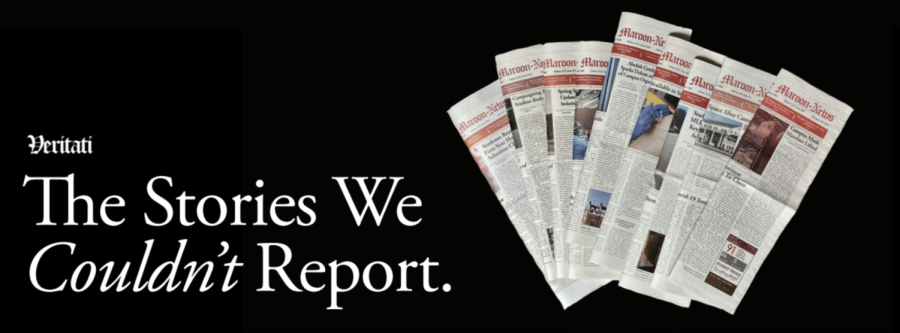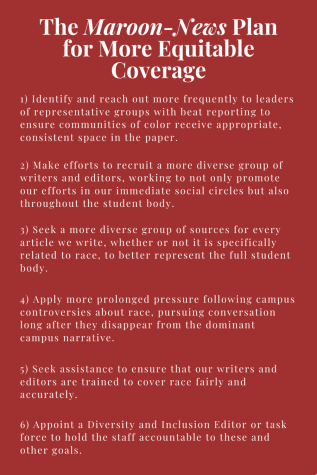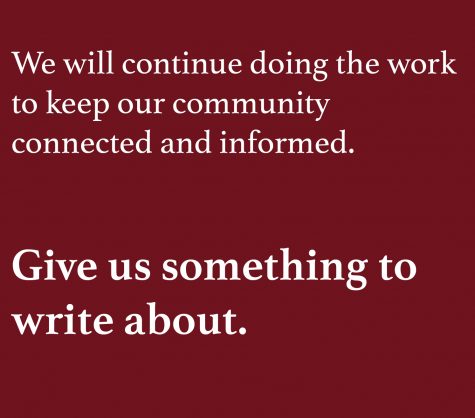The Stories We Couldn’t Report
Reporting the many stories of Colgate is far from easy. The Colgate Maroon-News Editorial Board describes the details we couldn’t tell you in the final piece of the 2021-2022 academic year.
As we reflect on our coverage over the past year, while the big headlines and major stories stand out, so do those that never made it to print. Whether fear of retaliation kept students from coming forward with quotes – even anonymously – or even just an across-the-board unwillingness to go on the record, the editorial board of The Colgate Maroon-News remains plagued by the voices and stories that were never heard by the Colgate and Hamilton communities.
This problem is not new, but arguably more important than ever, especially as journalism has been under attack with the proliferation of the ‘fake news’ movement. “One of the most consistent challenges I’ve faced on the Maroon is reluctance,” former Editor-In-Chief Emily Rahhal wrote last spring. “Reluctance to go on the record, reluctance to allow me into spaces, reluctance to engage in difficult topics, reluctance to share opinions” – this rings as true today, where YikYak’s resurgence has encapsulated the ugliest version of campus rumor mill over the past year.
As student journalists, we’re obligated to cover – and attempt to uncover – the most important issues on Colgate’s campus so that students, faculty, staff, and community members can stay informed. Yet the record put forth by The Maroon-News consistently fails to accurately reflect the conversations going on in GroupMes, around Frank dinner tables, library whispers, and even on Instagram stories. This willingness to talk, though, seems to stop short when faced with the prospect of going on the record and having one’s name published directly with their opinion. When the paper represents a space for genuine and factual dialogue on a matter, the inability to gain critical student and administrative perspectives often results in a lack of clarity, accountability, and inhibits our ability to tell the wholehearted truth.
The willingness to bear witness is no small feat. To speak up and contribute to a living record of life at Colgate or in Hamilton is a powerful act to bring about awareness, inspire change, and even call for accountability. In the face of an unforgiving and rapid rumor mill, the truth can feel out of reach, and when anonymous forums muddle the narrative even further, the paper represents a valuable space to which one can look for facts, multiple informed perspectives and meaningful discourse. Going on the record isn’t just offering a quote or two for a story; it can also be submitting an op-ed, or collectively writing a letter to the editor in order to offer perspectives on an issue, or a response to administrative action and decisions. Year after year, the same issues seem to plague our campus – ranging from sexual violence to recurring rumors of drugging, from problematic social dynamics to various race issues – and the only way to break these cycles and begin the process of real change is to use your voice.
There is a serious issue when students trust the rumor mill more than the student newspaper. Last year, every student rushed to buy a New York Pizzeria (Slices) t-shirt before they supposedly closed at the end of the semester, and this semester we have heard friends whisper that Flour and Salt forced Rye Berry out in their campaign to take over Hamilton. Although neither of these stories are true, they run rampant through social settings — everyone desperate to be the first to share the news. The unfortunate truth is that good journalism takes time and investment from the community — being informed means more than being first.
Ironically enough, we know that The Maroon-News isn’t widely considered a trusted source by faculty, staff, students or community members mainly due to the lack of represented voices and occasional — but certainly real — inaccuracies. Some professors don’t trust students to report the news, and some students assume The Maroon-News is a university publication, both failing to recognize the potential the publication has. Going on the record is not just about standing by your opinions, it is also about fostering a community of integrity. It may seem harmless within the Colgate bubble, but this rampant spreading of information without concern for the facts is what allows misinformation to spread virally. A 2018 MIT study attributed the quicker spread of false news on Twitter to the appeal of novelty. When our readership turns away from the paper we can no longer authentically report stories because balanced journalism requires community investment in uncovering the truth. And of course criticism of articles, opinion pieces, and the paper generally can often be healthy and help us grow. One of our biggest inhibitors is our inability to get students, faculty, and staff to talk. The quality of our reporting, the stories we cover, and the voices we represent would only be strengthened by further participation and a willingness to speak up.
The sense of disconnect between the student body, administration and the Hamilton community is just one byproduct of reluctance to go on the record, on all fronts. Students often complain about institutional indifference to issues yet decline to express their views on the issues when asked to directly comment. While at the same time various members of Colgate’s administration have noted to our editors their surprise or lack of awareness at various matters that are hot topics across the student body for months or even years. This disconnect often results in outcries of tone-deaf administrative actions and decisions from students, administrative unawareness of the most pertinent issues about which students are passionate, and heightened tensions and feelings of not being heard. When discourse is limited to Yik Yak and common rooms, there is a missed opportunity to utilize The Maroon-News to bridge the gap between students and administrators, or even Student Government or Hamilton residents, facilitating the kind of conversation that might lead to real change rather than being disseminated temporarily and anonymously.
Being on a small, interconnected campus means the rumor mill moves quickly as students actively seek out information. Everyone, afterall, knows everything. We’re all guilty of speaking too quickly and spreading unconfirmed information – it’s part of our daily lives as Colgate students. At the Maroon-News, we’re guilty of it too. We have the same reactions to University emails that you do, but what we’ve learned is that there’s typically more to the story. It takes asking questions, knocking on doors, calling cell phones late at night, and even occasionally an early morning trip to the Hamilton Police Station. It takes time to build trust with both administrators and students, and there is zero room for error. Each year, we have to rebuild those relationships after a summer hiatus and the influx of a new staff.
As students, we are all cued in to what happens on campus in the same way that all of you are. But here’s the difference: we have laws, guidelines, and ethical considerations that make every word you read matter. Again, there is no room for error in what we do. We know that the difficulty of going on the record is immense. There are various power dynamics on this campus that makes that difficult and different for every individual. But you have our word, and you must hold us accountable to it. By talking to us, you are safe, protected by laws and regulations, and most importantly, by the sympathy, compassion, and commitment of this staff to report on what matters and do it the right, just, and fair way.
People talk about the Colgate bubble as if it is one all-inclusive sphere, but the spread of information on campus is anything but democratic. Newspapers at their best are democratizing forces, making the news accessible to all and bringing attention to important issues. In October 2020, when Ashley Bound published an open letter to faculty in The Maroon-News commentary section begging them to realize the unprecedented stress students were facing, every professor I had brought it up and checked in on their classes. In June 2020, when the staff of the Maroon-News published an editorial on the cycle of racist incidents at Colgate, everyone was abuzz discussing the events that happened before their time here and the impact of having this on the record. And just recently, when The Maroon-News published an article surrounding the pervasive issue of internal lists on campus, students across campus circulated the story, exclaiming their appreciation for hearing both sides of the issue and an ongoing effort to change this system. Any member of the Colgate community can submit a commentary piece for review and start campus dialogue on something that is important to you, but these conversations do not have to be limited to the commentary section. The Maroon-News serves as both a forum and a powerful archive, and it is our duty as students to keep it vibrant. The first step to changing Colgate into the school we hope it can be begins with a willingness to bear witness, to go on the record, and to capitalize on the power of real journalism.





